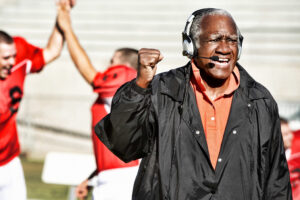Traits of a Great Youth Football Coach: Building Trust and Managing Expectations

When it comes to youth football, the right coach can make all the difference. Beyond teaching plays and techniques, a good coach shapes young athletes into disciplined, confident, and respectful individuals. Parents and players alike should understand what to look for — and how to manage expectations — when joining a program.
1. Character and Leadership Matter Most
A great youth football coach leads with integrity. They set the tone by modeling discipline, effort, and sportsmanship. Kids learn as much from how a coach behaves as they do from what’s taught on the field. A good coach encourages players to do their best while treating everyone — from star athletes to beginners — with equal respect.
2. Focus on Development Over Wins
While everyone loves to win, the best coaches emphasize player growth and fundamentals. At the youth level, success is about teaching skills, teamwork, and accountability, not just scoreboard results. A coach who keeps development as the top priority ensures players build a strong foundation for future success.
3. Communication is Key
Open, honest communication between coaches, players, and parents keeps everyone on the same page. A good coach explains expectations clearly — from practice habits to game conduct — and provides constructive feedback in a positive way. Parents should feel comfortable approaching the coach with questions, trusting that communication will remain respectful and transparent.
4. Managing Expectations for Everyone
It’s important for both parents and players to understand that progress takes time. Not every athlete will be a starter right away, and that’s okay. Coaches juggle the responsibility of developing all players while competing in games. When parents trust the process and support the team’s goals, it creates a healthier environment for everyone involved.
5. Building Trust in the Coaching Relationship
A trustworthy coach puts the players first. They prioritize safety, fairness, and personal growth over personal agendas. You can spot a coach you can trust by how they talk about the kids — not as trophies, but as individuals learning life lessons through football. Ask around, observe practices, and notice how the coach interacts with players. Trust is earned through consistency and care.

How Great Coaches Approach Player Development in Tackle Football
Player development in tackle football goes far beyond physical strength and big hits — it’s about teaching the game safely, correctly, and with purpose. Great coaches understand that developing young athletes requires patience, structure, and a focus on long-term growth over short-term results.
Emphasizing Safety and Fundamentals
The best coaches know that safety starts with proper technique. They teach tackling and blocking through controlled, step-by-step progressions — focusing first on body position, balance, and awareness before full contact. By emphasizing “heads up, eyes up” tackling form and proper pad level, they build players’ confidence while preventing injuries. Safety isn’t just a rule — it’s a culture that good coaches reinforce every practice.
Building Football IQ
A good youth tackle football coach doesn’t just run plays — they teach players why each play works. Explaining concepts like gap responsibility, down and distance, and teamwork helps kids understand the bigger picture. Great coaches use film sessions, chalk talks, and walk-throughs to help players think critically and see the game from multiple perspectives. This builds smarter players who make better decisions on the field.
Developing All Players, Not Just the Stars
Strong coaches believe every player on the roster matters. They rotate kids through positions to help them learn different roles and find where they fit best. Instead of focusing only on the starting lineup, they create a culture where every athlete feels valued and motivated to improve. This approach develops depth, leadership, and a stronger team overall.
Balancing Competition with Confidence
Competition is part of football, but great coaches understand that confidence is what keeps kids coming back. They challenge players to push past their limits while also celebrating small victories — a well-executed block, a textbook tackle, or a great hustle play. By balancing accountability with encouragement, they help kids develop resilience and a love for the game.
Teaching Life Lessons Through Football
Perhaps most importantly, good coaches use football as a tool for personal growth. They teach discipline, teamwork, humility, and perseverance — lessons that extend well beyond the field. Player development isn’t just about creating better athletes; it’s about developing better people.
The Circle City Elite Approach: Developing Champions On and Off the Field
At Circle City Elite, our coaching philosophy is built around one core mission — developing young athletes into well-rounded leaders both on and off the field. Our staff of former high school, college, and NFL players understands that youth football is about far more than winning games. It’s about teaching kids to play the game the right way, the safe way, and the smart way.
We focus on fundamental skill-building, from proper tackling techniques to positional awareness, ensuring that every player develops confidence through consistent, safe instruction. But we also believe in nurturing the mental side of the game — fostering discipline, resilience, teamwork, and respect in every athlete who wears our jersey.
At Circle City Elite, player development doesn’t end at the final whistle. We mentor our athletes to carry the lessons learned on the field — leadership, accountability, and hard work — into the classroom and their daily lives.
If you’re looking for a youth football program led by coaches you can trust, who prioritize player safety, growth, and character, Circle City Elite is the place to be.
👉 Learn more or register today at circlecityelite.org
📧 admin@circlecityelite.org
| 📞 317-646-2499
